Overview Structure
CEP is designed as a 4 semester Master programme with the following general structure.
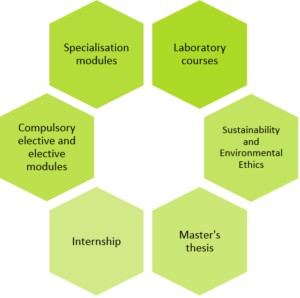
The M.Sc. CEP degree programme is made up of different modules in the two specialisations energy systems and energy technologies.
The general structure includes specialisation modules and laboratory courses as well as compulsory elective modules in the chosen specialisation and elective modules.
A seminar on “Sustainability and Environmental Ethics” as well as an Internship and the Master’s thesis are mandatory parts of the programme.
The content of the individual semesters is described in detail below:
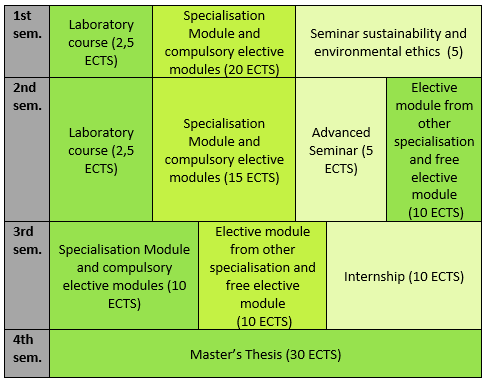
Specialisation energy systems and energy technologies
The Master’s degree consists of two specialisations allowing for an individual path, tailored to students’ own needs, interests and future career planning.
Below you can find the modules for the specialisation ENERGY SYSTEMS (subject to change).
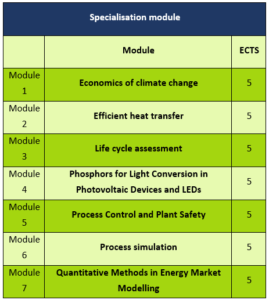
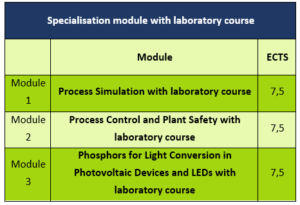
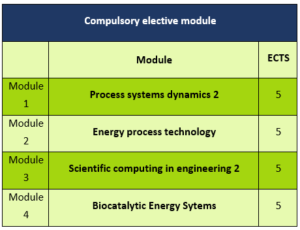
In the specialisation energy systems competencies are acquired in particular in the application areas of the further development of energy systems. Methods are deepened which facilitate the design of process chains for the generation, utilization and integration of renewable energies in the energy system and integration of renewable energies in chemical processes.
Below you can find the modules for the specialisation ENERGY TECHNOLOGIES (subject to change).
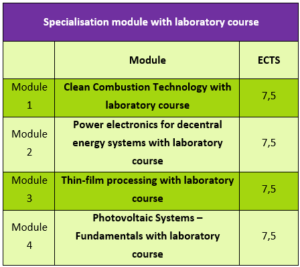
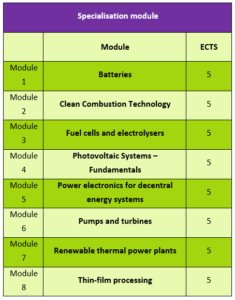
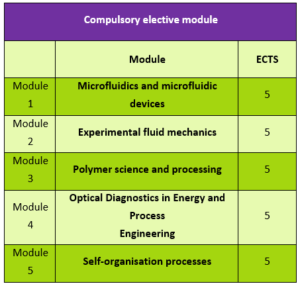
In the specialisation energy technologies fundamental methods for the development and implementation of new technologies for the generation and conversion of renewable energies are studied in-depth.
1st semester courses
Module with Laboratory course (2,5 ECTS)
The module with laboratory course is a practical course associated with the student’s choice of specialisation. In the mandatory safety instruction, the students learn to identify potential hazards and work safely in a laboratory environment. The students apply the knowledge gained in the different CEP modules, learn how to operate state-of-the-art scientific equipment, perform experiments, analyse, discuss and summarize their results in a written report.
Specialisation module and Compulsory elective module (15 ECTS)
The specialisation module and compulsory elective module enable students to gain in-depth knowledge of an area of their chosen specialisation.
Modules in the specialisation energy systems include for instance:
- Effective heat transfer
- Process Control and Plant Safety
- Phosphors for Light Conversion in Photovoltaic Devices and LEDs
- Microeconomics
Modules in the specialisation energy technologies include for instance:
- Clean Combustion Technology
- Batteries
- Power electronics
- Fuel cells and electrolysers
- Photovoltaic Systems
Seminar Sustainability and Environmental Ethics (5 ECTS)
The Seminar Sustainability and Environmental Ethics sets the scence for studying CEP by taking into account the relation and impact of global change, ecosystem degradation and resource limitations on society. Key knowledge areas of sustainability theory and practice, including population, ecosystems, global change, energy, agriculture, water, circular economy, environmental economics and policy, ethics, and cultural history are tackled in the module.
2nd semester courses
The Lab Course (2,5 ECTS), Specialisation module and compulsory elective module classes (15 ECTS) continue in the second semester.
Advanced Seminar (5 ECTS)
In the Advanced Seminar students learn tools and methods to find and identify scientific literature and on how to present the findings. At the end of the module students do a presentation for a specialist audience and discuss their findings.
Elective module from the other specialisation (5 ECTS)
The Elective module from the other specialisation allows an individual choice of a specialisation module.
Hereby students from energy systems can dive deeper into selected topics of technologies like batteries, thin-film processing, clean combustion technology among others. Specialists from energy technologies can gain in-depth knowledge for instance in process simulation, life cycle assessment or efficient heat transfer.
Elective module (5 ECTS)
The free elective module allows students to choose from the FAU list of modules. The modules include a variety of possible classes like soft skills or languange courses as well as courses from the Faculty of Engineering.
3rd semester courses
Classes in the Specialisation module and Compulsory elective module (10 ECTS) are continued in the third semester. Equally the elective module from other specialisation and the free elective module are continued (10 ECTS).
Internship (10 ECTS)
The 12-week long internship in either industry or a research institution in Germany or abroad aims giving students the opportunity to gain practical work experience and apply gained knowldege and competences. Students are required to organize the internship independently. However, the CEP office is always happy to provide support and advice.
4th semester - Master's thesis
Master’s thesis (30 ECTS)
The 6-month Master’s thesis is written and carried out at one of the chairs of the department of Chemical and Biological Engineering. It is an independent research project or thesis performed by the student under supervision and guidance of a supervisor. The thesis involves a survey of scientific literature to understand the state-of-the-art of the research field, independent planning, conducting of experiments as well as the analysing and interpretation of the obtained data. The Master’s Thesis is a complete scientific document written by the student. The results are also presented in a short talk within the chosen institute.
